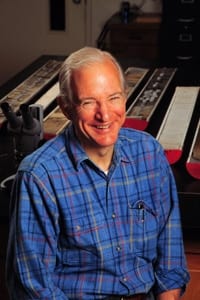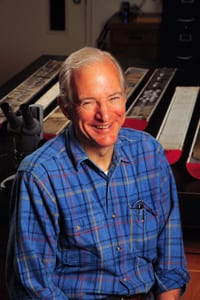WHOI Geochemist to be Honored By the American Chemical Society
 John Hayes (Tom Kleindinst, WHOI)
John Hayes (Tom Kleindinst, WHOI) March 5, 2003
Senior Scientist John Hayes of the Geology and Geophysics Department at Woods Hole Oceanographic Institution (WHOI) will receive the American Chemical Society’s 2003 Geochemistry Division Medal at the group’s 225th national meeting in March in New Orleans.
Hayes is being recognized for his contributions to an understanding of organic geochemistry, cosmochemistry, isotope geochemistry and paleoenvironmental analysis. His development of continuous-flow isotope ratio mass spectrometry techniques paved the way for compound-specific isotopic analysis, opened frontiers between isotopic and molecular organic chemistry, bridged the fields of geochemistry and biology and shed new light on modern and ancient biogeochemical processes.
The award, an engraved bronze medallion and cash prize, is presented biennially to an individual for outstanding accomplishment in any area of geochemistry.
Hayes has spent much of his career studying the relative abundances of the isotopes of carbon in organic compounds and refining techniques for examining the cycling of carbon through plants and animals, rocks, the atmosphere and the oceans. His efforts have contributed to understanding the evolution of life on earth and perhaps on other planets.
John Hayes joined the WHOI staff in 1996 to serve as Director of the National Ocean Sciences Accelerator Mass Spectrometry Facility (NOSAMS) at the Institution. The facility, established in 1989, accurately measures the abundance of carbon-14 in samples ranging from seawater to ocean sediments, corals and microscopic shells called forams. When used for dating, the results provide a precision of plus or minus 30 years for a 10,000-year-old sample. NOSAMS serves the ocean sciences community in the United States and is the only such facility devoted to the oceans among the world’s few similar AMS facilities. Hayes, a native of Montana, holds degrees in chemistry from Iowa State University and the Massachusetts Institute of Technology.
WHOI is a private, independent marine research and engineering, and higher education organization located in Falmouth, MA. Its primary mission is to understand the oceans and their interaction with the Earth as a whole, and to communicate a basic understanding of the ocean’s role in the changing global environment. Established in 1930 on a recommendation from the National Academy of Sciences, the Institution is organized into five scientific departments, interdisciplinary research institutes and a marine policy center, and conducts a joint graduate education program with the Massachusetts Institute of Technology.

